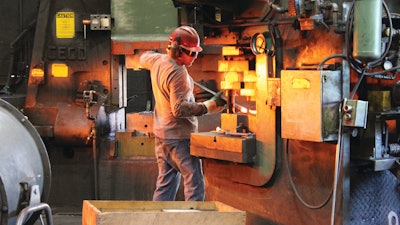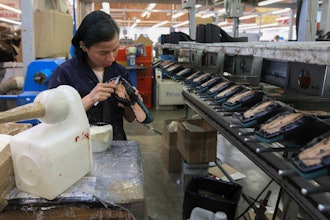
According to a June 2023 poll by Morning Consult, two-thirds of U.S. consumers said they “routinely sought out” products that were made in the USA — a result the firm said was “not dented” by recent economic headwinds.
But consumer goods are just one very application-specific component; potential customers may find it easier to place trust in a foreign-produced product if it doesn’t serve a critical purpose. For users of professional tools, the stakes are much higher.
Many companies work to position their messaging around the domestic materials and assembly that comprise their end products, but for some, it’s a game of inches — careful wording that illustrates a process that’s American-“made,” but leverages the lower costs of globally sourced materials.
For Wright Tool, however, there is no need to segment its process in order to badge its products “American-made.” That’s because this Ohio company truly walks the walk on domestic production, and has done so for nearly a century — meaning everything from materials to production is taking place here.
But Wright isn’t just a one-trick pony; as the company illustrates proudly on its website, it’s “forging more than just tools.”
History Supports a Modern Maker
Tom Futey, president and co-owner of Wright Tool, said the company was essentially born on the idea of keeping production close. In 1927, founder C. Nelson Wright was a salesman for another tool company when he determined he wanted to make his own tools. Passing along this legacy, his son, Dick Wright – a design engineer – “really exploded [the growth of] the company in terms of quality manufacturing, processes and patents,” said Futey. The culture of quality and domestic production remained intact over the years as Wright continued to grow under the tutelage of long-serving leadership — Futey is just the fourth company president in 97 years.
Wright’s talent supported a business that was built around “made-in-America,” and in a competitive tool market, Wright wants to ensure that the industry understands that these values have remained unchanged. Mike Taylor, Wright’s VP of operations, explained that the company is able to maintain it through 17 internal departments to eliminate outsourcing and ensure quality.
Supply chain manager Tom Clark added that the company’s quality processes ensure that Wright inspects every lot of steel that comes through the door “to ensure it’s actually a domestic USA melt, or else our name doesn’t go on the product.” Then, Wright does its own forging “to create maximum strength and designed to provide superior performance,” according to the company’s website. Wright says it only needs to outsource one material – black oxide – and it does so from a company that’s just a few miles down the road, making its sourcing supply chain little more than a single link.
Promoting a Competitive Advantage
 Wright Tool
Wright Tool
As things have evened out a bit – and Wright’s team is back at capacity – the company turned to efforts to get the word out about their embedded competitive advantage in the market. There are practical reasons for distributors to buy American, especially as more work to regionalize their supply chains. Another way Wright targets the industry is by marketing to end users in critical industries, knowing that the distribution channel wants to provide customers with what they want and need — and there’s no better way to do that than providing tools that last while supporting them with classic, personal customer service.
Futey proudly explained that Wright’s tools have no warranty; in their mind, a tool only needs a warranty if it breaks, and these don’t. And if you want to see just how the sausage is made – within reason, of course – Wright is happy to open its doors for customers to get at glimpse at the process, which includes regular dimensional inspections, hardness checks and the like — all on-site at the plant.
Taylor also stressed that, despite this heavy emphasis on quality and inspection, it doesn’t make for a price tag that’s unsustainable: because the company’s processes are so refined, he explained, “we’re able to keep our price point fairly competitive.”
True Craftsmanship
With no plans to change its approach to quality, domestic tool production, the future looks bright for Wright. Said Futey, “We’re ready for the next generation of growth.”
This will come at the hands of Wright’s dedicated and talented team. Wright’s leadership takes pride in its workforce, pointing to three team members who were recently lauded for 40 years of service within the organization — a rare feat in any business.
“Like everybody, we had difficulty hiring during the early 2020s,” said Taylor, “but we’ve been able to beat the market [since then] in how we’ve been able to not only acquire people, but retain them.”
One way Wright does this is by building the feedback of all employees into the strategic process. “Birthday roundtables” are a way to gain consistent input: each month, those celebrating birthdays are able to sit down and offer feedback on the operations. The company then reports the actionable steps taken based on that input at its quarterly meetings. Birthday roundtables have turned into having “160 board members,” said Futey. “Those have been wonderful to engage people.”
Another thing Taylor believes critical to the team’s engagement goes back to the focused production process so inherent to Wright’s business.
“One of the things we instill here is actual, true craftsmanship,” Taylor said, “to make the American dream.”























